
Following massive, youth-led anti-corruption demonstrations in Nepal, the country’s former Chief Justice Sushila Karki looks set to become interim prime minister. This week, protesters set fire to the Parliament and other government buildings, and at least 21 people were killed in a police crackdown. The protests continued even after the government lifted its ban on social media platforms and Prime Minister K.P. Sharma Oli resigned.
“We don’t really know what is happening at the moment … since most of our state institutions have been either destroyed or are nonfunctional,” says Pranaya Rana, a writer and journalist based in Kathmandu. “We really are counting on the new generation, the Gen Z, who led the protests, to take us forward.”
Transcript
AMY GOODMAN: This is Democracy Now!, democracynow.org. I’m Amy Goodman.
We end today’s show in Nepal, where the country’s former Chief Justice Sushila Karki looks set to become the interim prime minister, following massive, youth-led anti-corruption demonstrations. Protesters set fire to the Parliament and other government buildings Tuesday amidst a police crackdown. Officials said today, at least 51 people have been killed, including 21 protesters. The protests continued even after the government lifted its ban on social media platforms and after Prime Minister K.P. Sharma Oli resigned.
PROTESTER: [translated] Everything that has happened is not because of the social ban. We need a young leader now. We are looking for change. Time is up for these old leaders. We don’t need them. We need the youth.
AMY GOODMAN: For more, we go to the capital of Nepal, to Kathmandu, where we’re joined by journalist Pranaya Rana.
Thank you so much for being with us. Can you describe the scene right now in the streets, and the significance of what has happened in these youth-led protests, but also this terrible death toll of at least 51 people?
PRANAYA RANA: Hi, Amy. Thank you for having me.
So, right now I’m in Kathmandu. We are still under curfew and prohibitory orders. The Nepal Army is out on the streets patrolling. And we are really in a state of confusion, as we don’t really know what is happening at the moment or where the [inaudible] direction the country will go in, since most of our state institutions have been either destroyed or are nonfunctional.
So, we really are counting on the new generation, the Gen Z, who led the protests, to take us forward. Right now negotiations are going on between former Chief Justice Sushila Karki and President Ram Chandra Poudel. They are expected to hash out a deal by today for Madam Karki to become the interim prime minister and lead the country towards fresh elections within six months.
AMY GOODMAN: And who is she? Who is this new interim prime minister? And how do the students feel, the youth feel, about her?
PRANAYA RANA: So, Madam Sushila Karki, she’s a former chief justice. She’s the only female chief justice in Nepal’s history. She resigned — I mean, not resigned. She retired in 2017 after facing an impeachment motion by the political parties who have been kicked out of power right now. The impeachment motion did go through Parliament, but it was nullified by the Supreme Court for not being in line with the Constitution.
So, Madam Karki has always — she has cultivated a reputation for being very anti-corruption, and she also believes that the political parties should hand over leadership to the next generation. So, that’s why her stances resonate with the younger generation, the Gen Z, who have led these protests. She was also one of the few senior leaders of the country who came to the streets to protest the 19, now 21, young protesters who were killed on September 8th.
AMY GOODMAN: Can you talk about the government shutting down some 26 social media platforms and how that intensified the protests, and why they focused on social media?
PRANAYA RANA: Well, the social media ban has been in the works for a number of years now. The successive Nepal governments have tried to get social media networks to register within Nepal and appoint a local representative here so that they can reach out easier when they need to take down offensive material. Most of the tech giants — Meta, Alphabet and all the other ones — they’ve all refused. Either they’ve ignored the request, or they’ve straight-up refused, saying that there is no law. So, the Nepal government has been trying to get them registered based on a directive that the executive issued, with — the directive is not an act passed by Parliament. So, a few social media companies have argued that if there is no law in place, we can’t register.
So, most recently, what happened was that the Nepal government gave the social media companies a seven-day ultimatum, a seven-day deadline to register, threatening to ban them if they did not. The seven-day deadline passed with no one registering, so the government moved ahead with the ban.
The ban happened to coincide with a widely youth-led movement on social media against corruption and against nepotism, especially of the children of the politicians who are currently in power. So, the youth felt that the social media ban was one more attempt by the government to suppress their voices, take away their free speech, especially because they were criticizing the politicians’ families. So, that was the immediate trigger for the protests.
AMY GOODMAN: Pranaya, finally, can you talk about the economy, the economic despair felt by so many in Nepal today? For most Nepalis, the main source of income is remittances from their relatives working abroad. And then put it in a regional context, over these years these youth-led rebellions, particularly also around the economy. You have Sri Lanka in 2022; Bangladesh, its July Revolution, throwing out Sheikh Hasina; most recently, Indonesia, and the spark being the killing of a 21-year-old delivery driver, that led to so much protest. Talk first about Nepal.
PRANAYA RANA: Yes. So, as you said, the Nepali economy basically depends completely on remittances that are sent back by migrant workers, most of whom are in the Gulf states or in Malaysia or in South Korea, where they work labor jobs. Remittances equal about 25% of our GDP. So, that’s how important remittances are to this country.
But sadly, most youth feel that they have no future here. They cannot make the amount of money that they would make doing a manual labor job in, say, Qatar or Saudi Arabia. They cannot make the same amount of money working even a [inaudible] job or a white-collar job here in Nepal. So, that resentment has been building. Even students feel that they cannot get a job here in Nepal, so they choose to migrate to foreign lands immediately upon graduating high school or graduating college. So, that is —
AMY GOODMAN: I want to thank you so much, Pranaya. We’re going to have to leave it there, but we’ll continue these discussions, because this regional context is so important. Pranaya Rana is a writer and journalist based in Kathmandu, Nepal.
And as we wrap up our broadcast, the late breaking news on the murder of the conservative activist Charlie Kirk: CNN has confirmed law enforcement has a man in custody who confessed to his father about shooting Kirk. The father reportedly told authorities and said he had secured his son until he could be formally detained. This morning, President Trump said on Fox News, quote, “Somebody very close to him turned him in. The person was involved with law enforcement, but was a person of faith, a minister, and brought him to a US Marshal who was fantastic. They drove into the police headquarters, and he’s there now,” Trump said. I’m Amy Goodman. Thanks for joining us.

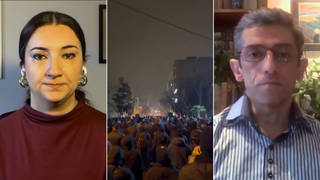
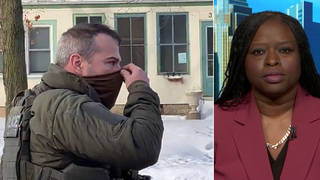
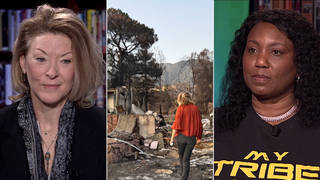
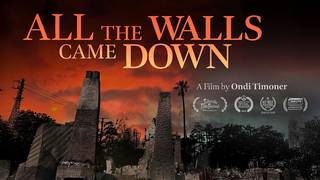
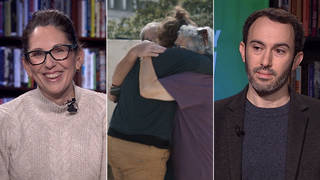

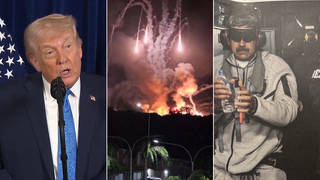

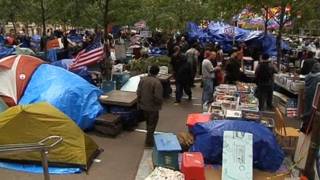


Media Options